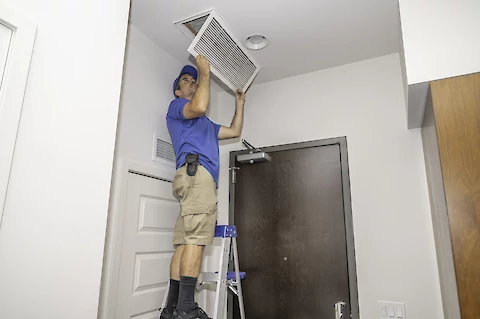
Indoor air quality has a profound impact on our health. Seniors, particularly those with respiratory issues or weakened immune systems, are significantly affected by the quality of air they breathe in their homes.
Maintaining and improving indoor air quality is a vital aspect of senior care. This article explores ways to help seniors and their caregivers ensure a cleaner, healthier indoor environment.
The Importance of Healthy Indoor Air Quality for Seniors
Seniors are more susceptible to the adverse effects of air pollutants due to age-related reductions in lung capacity, decreased immunity, or pre-existing medical conditions. Pollutants like dust, mold, pet dander, and synthetic chemicals can exacerbate respiratory ailments and trigger allergic reactions. Therefore, improving indoor air quality becomes a critical strategy for healthy living in seniors.
Practical Tips for Maintaining and Improving Indoor Air Quality
There are numerous ways to improve indoor air quality. These are at the top of the list:
Regularly Change Air Filters
Air filters in HVAC systems play a significant role in maintaining the purity of indoor air. Over time, these filters can collect pollutants and contribute to poor air quality if not changed regularly. As a rule of thumb, change filters every 90 days or every 60 days if you own pets. Regular replacement of these filters not only aids in trapping pollutants but also ensures efficient working of your HVAC system.
Use Air Purifiers
Air purifiers are an excellent tool for improving indoor air quality. Portable air purifiers, especially those with High-Efficiency Particulate Air (HEPA) filters, can trap microscopic pollutants often missed by HVAC filters. Don't rely on houseplants to clean your air. Their role is negligible, despite common misconceptions.
Control Humidity Levels
Proper humidity control is necessary to prevent the growth of mold and mildew, which are harmful to respiratory health. The ideal indoor humidity level is between 30% to 50%. Use a dehumidifier in damp areas and promptly repair leaks. Use exhaust fans while cooking or bathing to help maintain appropriate humidity levels.
Practice Proper Ventilation
Ventilation is another cornerstone for improving indoor air quality. Simple measures like opening windows when weather permits, using window fans for cross-ventilation, or using vented exhaust fans can reduce indoor pollution levels. These practices promote the exchange of indoor and outdoor air, ensuring the continuous circulation of fresh air inside the houses.
Reduce Use of Harsh Chemicals
Many household cleaning products contain chemicals that can contribute to indoor air pollution. Consider using natural alternatives such as vinegar, baking soda, or lemon juice, which can be just as effective for most cleaning tasks. Also, be mindful of products like air fresheners or candles that might contain synthetic fragrances and can release pollutants into the air.
Get Support From Senior Helpers Whittier-Downey
Improving indoor air quality is pivotal in ensuring a cleaner, healthier living environment for the elderly. Holistic care for older adults isn't just about immediate medical needs but also about creating an environment that supports their overall well-being.
If you live in Whittier, Downey, Pico Rivera, or Bell Gardens, we at Senior Helpers Whittier-Downey are here to help. Contact us today to learn more about our in-home senior care services and how we can assist you in creating a safe, comfortable, and healthy home for your senior loved one.